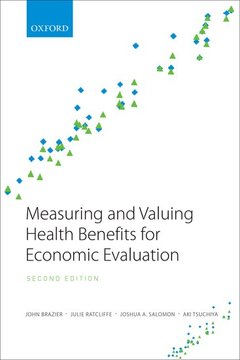Description
Measuring and Valuing Health Benefits for Economic Evaluation (2nd Ed.)
Authors: Brazier John, Ratcliffe Julie, Salomon Joshua, Tsuchiya Aki
Language: English
Subjects for Measuring and Valuing Health Benefits for Economic...:
Approximative price 82.73 €
In Print (Delivery period: 21 days).
Add to cart
Publication date: 11-2016
372 p. · 15.9x23.5 cm · Paperback
372 p. · 15.9x23.5 cm · Paperback
Description
/li>Biography
/li>
There are not enough resources in health care systems around the world to fund all technically feasible and potentially beneficial health care interventions. Difficult choices have to be made, and economic evaluation offers a systematic and transparent process for informing such choices. A key component of economic evaluation is how to value the benefits of health care in a way that permits comparison between health care interventions, such as through costs per quality-adjusted life years (QALY). Measuring and Valuing Health Benefits for Economic Evaluation examines the measurement and valuation of health benefits, reviews the explosion of theoretical and empirical work in the field, and explores an area of research that continues to be a major source of debate. It addresses the key questions in the field including: the definition of health, the techniques of valuation, who should provide the values, techniques for modelling health state values, the appropriateness of tools in children and vulnerable groups, cross cultural issues, and the problem of choosing the right instrument. This new edition contains updated empirical examples and practical applications, which help to clarify the readers understanding of real world contexts. It features a glossary containing the common terms used by practitioners, and has been updated to cover new measures of health and wellbeing, such as ICECAP, ASCOT and AQOL. It takes into account new research into the social weighting of a QALY, the rising use of ordinal valuation techniques, use of the internet to collect data, and the use of health state utility values in cost effectiveness models. This is an ideal resource for anyone wishing to gain a specialised understanding of health benefit measurement in economic evaluation, especially those working in the fields of health economics, public sector economics, pharmacoeconomics, health services research, public health, and quality of life research.
John Brazier is a Professor of Health Economics at the University of Sheffield. With more than twenty five years' experience of conducting economic evaluations for policy makers, he has a particular interest in the measurement and valuation of health where he has published widely (n>200). He has developed generic (SF-6D) and condition preference-based measures of health (e.g. cancer, asthma, diabetes, vision, mental health) and more recently looking at the role of well-being measures. He is Director of the Economic Evaluation in Health and Care Intervention Policy Research Unit (EEPRU) and advises policy makers on measuring and valuing benefits for economic evaluation and a member of the EuroQol group. Julie Ratcliffe is a Professor of Health Economics at Flinders University with a strong track record in health economics research. . She has over 100 papers in peer reviewed journals, including some of the most prestigious international health journals such as the British Medical Journal, Health Economics, and Social Science and Medicine and has co-authored 32 commissioned reports and discussion papers. She is currently Head of Flinders Health Economics Group (Flinders Health Care and Workforce Innovation) and Chair of the Flinders Centre for Clinical Change and Health Care Research focusing in the translation of evidence to clinical outcomes across multiple health care disciplines. Joshua Salomon's research focuses on priority-setting in global health, within three main substantive areas, measurement and valuation of measurement and valuation of health outcomes, modeling patterns and trends in major causes of global mortality and disease burden and evaluation of health policies and interventions. He is an investigator on projects funded by NIH and the Gates Foundation relating to comparability of health measures; the global burden of disease; modeling of infectious and chronic diseases and interventions; and evaluating the potential impact and cost effectiveness of
© 2024 LAVOISIER S.A.S.




